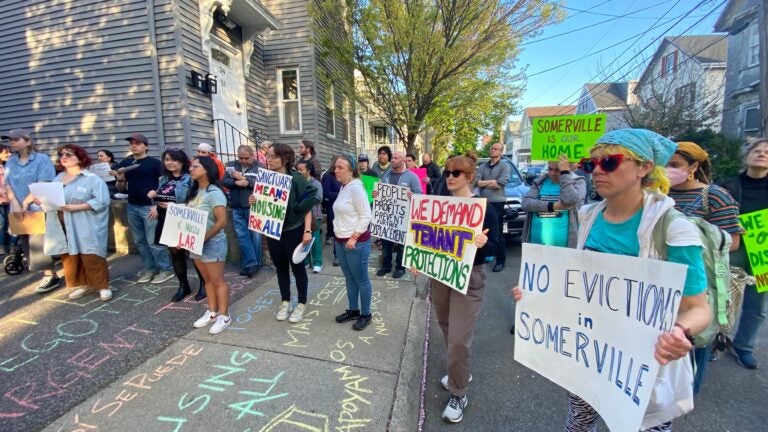Address newsletter
Get the latest news on buying, selling, renting, home design, and more.

Four days after his Somerville apartment was purchased by an out-of-state investor in early February, Michael Prentky received a letter: His rent was about to go up $1,200, to $3,200 a month, on April 1.
Should he and his partner opt not to renew their at-will tenancy in the three-unit building, Prentky needed to notify the property manager and give 30 days’ notice, the letter said.
“I hate to be cynical, but I had been expecting it,” Prentky, a 32-year-old musician, said recently as he stood outside his building at 22 Sargent Ave.
Since 2018, he’s lived there in Winter Hill in a three-bedroom apartment — which he described as effectively a two-bedroom, as the third is in disrepair.
In the months since the purchase, negotiations over the rent hikes between tenants in the building and the new landlord have stalled. Prentky and a resident in another unit each have received summonses for no-cause evictions — the process allowing landlords to seek to remove tenants for no specific reason.
“I’m not trying to get kicked out of my house,” said Prentky, “but it seems like, trying to look ahead, that’s the fate of things here.”
Housing advocates, tenant rights attorneys, and renters said these kinds of evictions — also known as “no-fault evictions” — are now part of a frequent pattern in Greater Boston, where investors and corporate buyers have become regular players in the housing market.
“No-fault evictions are no doubt helping fuel the speculation in Massachusetts, and especially in what is traditionally housing for working people,” said Eloise Lawrence, deputy faculty director of the Harvard Legal Aid Bureau, which provides legal services to low-income tenants facing eviction.

That trend, advocates said, looks like this: Investors and corporate buyers purchase multifamily housing, then move quickly to raise rents and evict tenants for either failure to pay the higher fees or without cause.
Even if tenants win their no-cause case in housing court, the matter remains on their record, advocates said.
“Having that no-fault option means that tenants who have done absolutely nothing wrong, always paid their rent, always been good, model tenants … doesn’t matter — [landlords] can wipe them out,” Lawrence said.
But property owners said no-cause evictions make up only a small fraction of evictions across Massachusetts and are a necessary resource to handle unruly renters or to make ends meet in an expensive real estate market — one in which investors can — and do — break even amid high interest rates, pricey mortgages, rising taxes, and climbing upkeep costs.
“It’s really hard to operate as a small landlord, and anybody who thinks there’s profit in it is kind of misunderstanding the reasons why landlords buy rental property in the first place,” said Doug Quattrochi, executive director of MassLandlords, a nonprofit trade association.
Of the approximately 3,100 evictions initiated in Massachusetts in February, about 300 were no-cause cases, according to an analysis the Massachusetts Housing Partnership, a nonprofit that works to boost affordable housing across the Commonwealth, published in April.
And that trend has largely remained consistent over the past 2½ years, with no-cause evictions making up about 10 percent of all filings, said Matija Jankovic, a senior research analyst at MHP.
But it is difficult to discern just how many of these filings were spurred by a landlord who purchased a property as an investment, Jankovic said.
Often, corporate buyers and investors buy properties through limited liability companies, or LLCs, and real estate investment trusts and hedge funds, making it challenging to track ownership information. Additionally, some individual buyers establish LLCs to protect their privacy and for financial liability reasons.
Still, evictions at large across the state have increased in recent years amid the rollback of COVID-19 pandemic-related renter protections.
Prior to the pandemic, the average rate of total eviction filings was about 2,600 per month, Jankovic said.
“There’s kind of a growing concern that just, generally speaking, if we stay at this rate of evictions … it’s just, it’s creating a lot of strain on our system to support tenants and people who are experiencing housing instability,” he said.
According to Ryan Pinto, who purchased 22 Sargent Ave. in Somerville earlier this year, rent increases at the three-unit building are necessary given its holding costs.
Records show Pinto bought the building for $1.2 million. Without raising the rent, Pinto said, he’s currently operating at around a $3,100-per-month loss with the below-market rents in place.
The increases he’s pursuing would help him just break even, he said, but that doesn’t even include the cost of maintenance and repairs in a building well over a century old. He said he’s willing to lose a few grand a year on the building, but at the current rate, the losses are simply unsustainable.
“The holding costs are really, really high for that property,” he said, pointing to a 7.87 percent interest rate, water and sewer rates, and property taxes that have jumped by about 20 percent since 2020.
A California-based engineer, Pinto previously lived in the area and owns four other apartment buildings and one-single family home in Massachusetts, he said. He has tried to pursue other options for the Somerville property, including selling it to a local nonprofit, he said.
That approach is one housing advocates often have praised as a way to maintain affordable housing in the region, and one Pinto said he also considers a viable solution to Greater Boston’s housing woes. But the parties involved were unable to form a deal within Pinto’s desired timeframe, according to both Pinto and Catherine Porter, an organizer at the Community Action Agency of Somerville who is working with the renters facing eviction.
Pinto offered to accept housing vouchers and give cash to tenants who leave on their own. CAAS, meanwhile, sought to cap rent increases and asked Pinto to consider larger financial incentives for renters who left on their own accord. So far, no agreement has been reached.
At this point, Pinto said, he has been left with no choice but to pursue the no-cause evictions, which he said are sometimes necessary for landlords like himself who are facing tough economic scenarios.
“They are absolutely vital,” he said. “They serve as a checks and balance … without that, the business is not viable.”
Quattrochi does not believe no-cause evictions are necessarily a phenomenon exclusive to real estate investors. He also rejects the notion those buyers are abusing them, as housing advocates suggest.
“I don’t think it’s abused. It’s not growing at all,” he said. “I just think it’s a mischaracterization from the renter side about what landlords actually have at stake when they go to court.”
In many instances, these cases follow other attempts at eviction, such as those over nonpayment of rent, he said.
“You look at the 12 percent of filings on an annual basis that are no-cause stated, and they’re very often associated with failed for-cause cases or other cases the landlord couldn’t move forward,” he said. “You see patterns of repeat evictions because the first one doesn’t stick.”
On a weekday evening in mid-May, more than 50 people crowded on the sidewalk and driveway for a rally at 22 Sargent Ave., listening as renters facing eviction and others called for solutions to keep them in their homes.
“The landlords can punch down, evicting at will with no repercussions, and we have no recourse. In fact, the eviction will permanently tarnish our records,” Prentky said, reading from prepared remarks.
“By allowing landlords to act in this way with impunity, Massachusetts and the city of Somerville are tacitly accepting bullying of poor folks in favor of landlords. This rule cannot remain. No-fault evictions need to be expunged from tenant records.”
Indeed, Prentky worries about what an eviction could mean for his future renting prospects, especially when he’s always paid his rent on time, he said.
“It’s totally a landlord’s market,” said Lawrence, of the Harvard Legal Aid Bureau. “The landlord, all they need to do is take a quick scan, and they don’t care what the eviction is for.”
Katherine Fustich, a housing attorney for the De Novo Center for Justice and Healing who is representing the renters at 22 Sargent Ave., said renters facing no-cause evictions have many opportunities to raise counterclaims and defenses in court.
“What I tell tenants all the time is that in a no-fault eviction case, your counterclaims only have to be worth $1” for you to be able to stay in your home, she said. “Basically, for you to win the case, if you owe your landlord $0 — you’re current on rent — you just have to prove to a judge or a jury that you have suffered $1 worth of damages from your landlord.”
Still, some said reforms are needed to protect renters better, especially because these cases can follow them long after they win in court.
Advocates with CAAS, the organizers behind the recent tenant rally, have called on lawmakers to lift the statewide ban on rent control and to enact the Tenant Opportunity to Purchase Act, which, if it becomes law, would require property owners to grant their renters or a selected representative, such as a land trust or nonprofit, the option of first refusal when their building goes up for sale.
Another bill, cosponsored by state Representative Samantha Montaño, a Boston Democrat, would set certain conditions for landlords who want a unit back from a tenant in good standing, such as when they intend to convert the apartment into a condominium or move into it themselves.
“I think that the narrative that’s often put out around this is that we’re looking for ways to have people squat indefinitely or just give no power to the landlord, and I don’t think that’s the case,” Montaño said.
“It’s just saying if you have a perfectly good tenant who’s paying their rent … and you just want an opportunity to make more money, we’re not in favor of that. We’d like to see more community stabilization.”
Prentky, who grew up on the South Shore and moved to Boston in 2010, said he’s watched friends leave over the years because of the region’s high cost of housing.
“The brain drain is so strong,” he said. “It’s like Boston is trying to push them out. They’re not even trying to keep people stable, and it’s destroying communities — it’s destroying the city.”
Christopher Gavin can be reached at [email protected].
Get the latest news on buying, selling, renting, home design, and more.





Stay up to date with everything Boston. Receive the latest news and breaking updates, straight from our newsroom to your inbox.
Conversation
This discussion has ended. Please join elsewhere on Boston.com